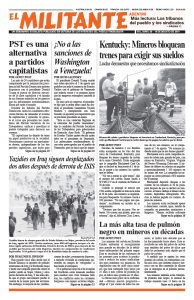Mexico’s president, Andrés Manuel López Obrador, who took office Dec. 1, has promised a “profound and radical” transformation of the country. His government is hoping its labor legislation and other welfare programs can be used to contain struggles by working people.
He has raised the minimum wage in most of the country by 16% to $5.10 a day and doubled it in the northern border zone to $8.80 a day. He has made a big show of reducing government expenses, cutting his own salary by 60% to $5,600 a month and eliminating thousands of federal jobs. And he has cut money for public hospitals, resulting in the layoff of workers, cutbacks on tests for sick patients, and cancellations of surgeries.
Nonetheless, López Obrador remains popular among working people.
Many workers hope the labor law reform passed April 29 will allow them to have a say in their unions. The law promises a secret ballot for voting on what, if any, union will represent workers at a given company. It requires that workers be given a copy of contracts negotiated by union officials and says they have the right to vote on it.
For decades workers had not elected which union was “representing” them at a workplace. Instead, the bosses and union officials — allied with the ruling party — cut secret agreements that included automatically deducting union dues from workers’ pay. Terms of the “contract” were worked out behind closed doors.
But a close look at the new law shows it’s not the step forward that it’s presented to be.
It replaces the old government-appointed labor boards, which favored the bosses and the political party in office, with labor courts. These courts in Mexico as well as in the U.S. are not neutral, however. They defend the “sanctity” of capitalist law regardless of which party appoints them.
Unions subordinate to the state
The new law ties workers up in red tape, in an attempt to strengthen control of the unions by the capitalist state. It aims to replace the old union bureaucracy with one more favorable to López Obrador and his Morena party, in hopes of shoring up the rule of the capitalist class, which faces a slowdown in economic growth and sharpening competition from rivals worldwide.
The new labor law states that the purpose of a strike is “to harmonize labor rights with those of capital.” But every class-conscious worker knows that a strike is a weapon used to wrest concessions from the bosses or prevent them from pushing down wages and working conditions.
Under the new law unions must be recognized by the labor court. They are required to give six days notice before going on strike, which is permitted only to win a contract or to ensure enforcement of a contract. The labor court can order the union to delay a strike for a wide variety of reasons. And it can order “essential personnel” to keep working during a strike.
Such measures have nothing to do with strengthening union democracy. They are an attempt to maintain housebroken unions.
That political course is nothing new. During the Mexican Revolution of 1910-20, and under subsequent regimes that culminated with the bourgeois nationalist government of Lázaro Cárdenas (1934-40), the trade unions were co-opted by the state to serve in a “common project” — strengthening of capitalism in Mexico. Concessions were granted to put a break on the toilers’ mobilization and subordinate the labor and peasant movement to the Mexican ruling class.
The union bureaucracy was an integral part of what became the Institutional Revolutionary Party, which ruled Mexico uninterruptedly for 71 years, until its electoral defeat in 2000. Union officials mobilized members to turn out the vote for the party and served in government posts. Until 2015 union officials were given positions on the board of directors of the state-owned Pemex oil company.
“In Mexico the trade unions have been transformed by law into semistate institutions. The statization of the trade unions was, according to the conception of the legislators, introduced in the interests of the workers, in order to assure them an influence upon governmental and economic life,” wrote Russian revolutionary leader Leon Trotsky in a 1940 article “Trade Unions in the Epoch of Imperialist Decay.” The article is included in the new Pathfinder Press book Tribunes of the People and the Trade Unions.
This class-collaborationist setup served the ruling class in Mexico and imperialists’ interests well, ensuring relative “labor stability” and low wages.
The same course is pursued by union officials in the United States, who urge workers to rely on getting “labor friendly” Democrats elected into office to pass laws that regulate what bosses can do.
‘America first’ poison
Democratic Party leaders in the U.S. Congress conditioned ratification of the latest U.S.-Mexico-Canada trade agreement to the passing of new labor laws in Mexico. Claiming concern for “how workers are treated in Mexico,” and not making it “lucrative” for American companies to move abroad, and to protect “American jobs,” they aim to convince working people that we have common interests with the employers. By doing so they undercut international solidarity with working people in Mexico and other countries.
Driven by harsh economic conditions and greater expectations, workers in Mexico are beginning to see their potential power. Earlier this year 35,000 workers at mostly foreign-owned parts factories close to the U.S. border went on strike, winning a 20% wage increase.
It is through building fighting unions and waging struggles independent of the ruling class and its parties that working people in Mexico and the United States can begin to chart a road forward, not relying on the capitalist state, its laws and representatives.


